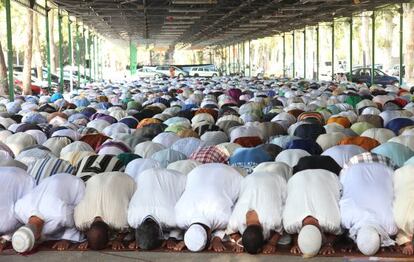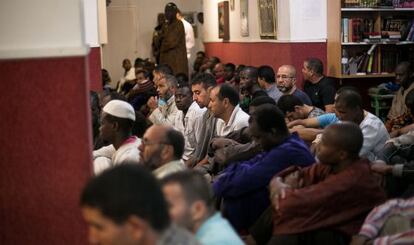Living on a prayer
Muslim communities are searching for new sites to build centers of worship in Catalonia But they are facing resistance from neighborhood groups and local authorities

The Muslim community in Catalonia is growing and requires new, bigger mosques. But the municipal authorities in the region, regardless of their political colors, seem determined to make the construction of places of worship as difficult as possible by creating regulations to keep them away from urban centers, suggesting they be built in industrial parks on the outskirts.
Often arguing that mosques in built-up areas will create conflict, local authorities across the region are throwing up all manner of obstacles. The most recent case has emerged in the Socialist-run town of Mollet del Vallès, where the Al Huda Muslim group has been trying to move to a larger center 100 meters from the building they have used for almost 20 years. Despite buying the new center, the group has fallen foul of a 2004 bylaw preventing the construction of places of worship in the area, which does not affect the previous building as it is not retroactive. Nevertheless, they began construction in the face of growing protests by local residents, whose pressure forced the authorities to seal off the building.
The Al Huda group displayed its discontent by reoccupying the center and praying in the street, outside the local seat of government, which responded by relocating them to an industrial park where the other Muslim society in the area has its mosque. What for Muslims is a right and a necessity appears to be a headache for mayors. The law provides for freedom to practice religion but residents push for mosques to be banished to the hinterland, away from their homes. In some instances, the authorities opt to simply put the problem off.
Recently in Badalona, Catalonia's third-largest city, licenses to build new religious centers were suspended for a year. The municipality said it would use the lull to "bring up to date and rationalize the conditions" for new centers and study their "adaptability to the urban landscape." Two nearby locations, Sant Adrià de Besòs and Santa Coloma de Gramenet, are working "along the same lines."
Licenses to build new religious centers were suspended for a year in the city of Badalona
The Popular Party (PP) mayor of Badalona, Xavier García Albiol, was investigated in 2010 on suspicion of inciting racial hatred for distributing an anti-immigration pamphlet. Beneath the slogan "We don't want Romanians" it depicted a picture of two women wearing veils with a banner reading: "Is your neighborhood safe?"
"I am not in favor of the model of putting religious centers in town centers; they should be placed where they won't bother anyone, in an industrial zone. That way you avoid conflicts of co-existence. My priority is residents' peace," Albiol says.
L'Hospitalet de Llobregat, Catalonia's second city, is already a step ahead of Badalona. The city council, run by the Catalan Socialist Party (PSC), suspended licenses for religious centers in 2011, and has now approved a plan to regulate the "location" of places of worship with the aim of "avoiding the annoyance that can originate from these centers being near to, or in, residential zones and to maintain the peaceful cohabitation of citizens."
"The Muslim community does not find it ideal to be in the basement of a building, among other things because of problems of co-existence," says the councilor for urban planning, Francesc Josep Belver. "It is not a religious matter, it is the same with nightclubs: it is not good to have them next to houses. We will work together to find the best solution to their needs."

The industrial park option is taking root in Girona province, with a mosque already built in Torroella de Montgrí and two more either in the construction or planning stages. The exception is Salt, a municipality with a history of racial tension and an almost 50-percent immigrant population, where in 2010 the PSC allocated several industrial plots for religious use. But the CiU center-right nationalists struck down the decision when they came to power the following year. The Al Hilal community has only one option left: the center of town, where they started to build a mosque that the local authorities stopped work on in the summer. Now they must wait for a resolution.
As well as the success story in Torroella, the PSC mayor of Palafrugell, Juli Fernández, suggested ceding a plot in the industrial park to the Asociación Centro Islámico del Bien for a period of 75 years.
Controversy over a mosque in Lleida has been raging for 15 years
In Lleida, though, things have not gone as smoothly. Daily prayers have been held in a municipal hall in the Cappont district after the city council closed the mosque in Nord street for continuously exceeding its legal capacity of 240; the local mayor, Ángel Ros, claimed that as many as 1,200 worshippers crammed into the space. The Muslim community was offered the hall to rent so that they wouldn't have to pray outside in winter. Last autumn, the group reached an agreement with local authorities to use the ground floor of a publicly owned conference center as long as no official events were being held there. But what was planned as a temporary fix has dragged on and the PP and residents' associations have started a campaign to prevent the use of the hall for religious purposes.
Controversy over a mosque in Lleida has been raging for 15 years after the Catalonia regional High Court vetoed the construction of a religious center in an industrial park outside the city. The case produced a judicial report that questioned the policy of putting mosques in isolated places, arguing that it could lead to the "segregation and isolation of the community" that could in turn foment an increase of the most radical sectors. The municipalities did not care for the report, arguing that it should be up to them to find the most suitable solution, while many Muslim communities welcome the industrial estate option because it prevents conflict and allows them to occupy larger spaces.
In Catalonia, between 15 and 20 of the 200 existing mosques are in such areas, according to Jordi Moreras, a sociologist and expert on the Islamic world. An investigation conducted by the Mossos d'Esquadra regional police force warns of an increase in radical Salafist preaching in five mosques in Catalonia. Four of them are in industrial parks in Tarragona, Reus, Torredembarra and Roda de Barà. In Lleida, imam Abdelwahab Houzi has been warned about his "fundamentalist touches" by Ros, who said his "messages of intolerance" went against the basic rights of Catalan society.
Tu suscripción se está usando en otro dispositivo
¿Quieres añadir otro usuario a tu suscripción?
Si continúas leyendo en este dispositivo, no se podrá leer en el otro.
FlechaTu suscripción se está usando en otro dispositivo y solo puedes acceder a EL PAÍS desde un dispositivo a la vez.
Si quieres compartir tu cuenta, cambia tu suscripción a la modalidad Premium, así podrás añadir otro usuario. Cada uno accederá con su propia cuenta de email, lo que os permitirá personalizar vuestra experiencia en EL PAÍS.
¿Tienes una suscripción de empresa? Accede aquí para contratar más cuentas.
En el caso de no saber quién está usando tu cuenta, te recomendamos cambiar tu contraseña aquí.
Si decides continuar compartiendo tu cuenta, este mensaje se mostrará en tu dispositivo y en el de la otra persona que está usando tu cuenta de forma indefinida, afectando a tu experiencia de lectura. Puedes consultar aquí los términos y condiciones de la suscripción digital.








































